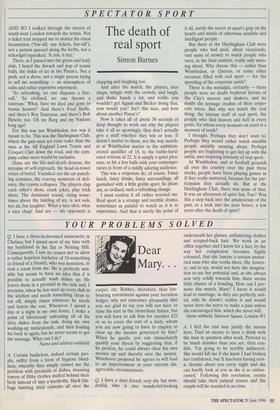SPECTATOR SPORT
The death of real sport
Simon Barnes
AND SO I walked through the streets of south-west London towards the tennis. Not a ticket tout stopped me to mutter his ritual incantation (`bar-sill, any tickets, bar-sill'), not a person queued along the kerbs, not a schoolgirl squeaked, 'It zim, it tizz.'
There, as I passed into the green and leafy club, I heard the thwack and pop of tennis balls, the tinkle of ice in the Pimm's. Not a push, not a shove, not a single person trying to sell me something — an atmosphere of calm and rather expensive enjoyment.
`So refreshing, no one disputes a line- call.' So civilised, no one throws a tantrum.' What, have we died and gone to tennis heaven? And there's Fred Stolle, and there's Roy Emerson, and there's Bob Hewitt, too. Oh my Borg and my Nastase long ago!
For this was not Wimbledon, nor was it meant to be. This was the Hurlingham Club, where the gate-men are even ruder than the ones at the All England Lawn Tennis and Croquet Club down the road, and the com- pany rather more would-be exclusive.
Gone are the life-and-death dramas, the screams of self-reproach, the head-in-towel crises of belief. Vanished are the air-punch- ing ecstasies, the roaring moments of defi- ance, the craven collapses. The players clap each other's shots, crack jokes, play trick shots. The dominant sound, rising some- times above the tinkling of ice, is not ooh, not ah, but laughter. What a nice shot, what a nice chap! And see — his opponent is clapping and laughing too.
And after the match, the players, nice chaps, mingle with the crowds, and laugh, and shake hands a lot, and really, you wouldn't get Agassi and Becker doing that, now would you? Isn't this nice, and how about another Pimm's?
Now it takes all of about 30 seconds of deep thought to work out why the players take it all so sportingly: they don't actually give a stuff whether they win or lose. It doesn't matter to them, not the way match- es at Wimbledon matter to the ambition- crazed qualifier of 18, to the battle-hard- ened veteran of 22. It is simply a quiet plea- sure, to hit a few balls with your contempo- raries in front of a mildly adoring audience.
This was a corporate do, of course. Fancy lunch, fancy drinks, fancy surroundings, all garnished with a little gentle sport. So pleas- ant, so civilised, such a refreshing change.
I must confess it all rather worried me. Real sport is a strange and terrible drama, sometimes as painful to watch as it is to experience. And that is surely the point of it all, surely the secret of sport's grip on the hearts and minds of otherwise sensible and intelligent people.
But there at the Hurlingham Club were people who had paid, albeit vicariously, vast sums of money to watch people who were, in the final analysis, really only mess- ing about. Why choose this — rather than Wimbledon, or Queens, or some other occasion filled with real sport — for the spending of the corporate quids?
There is the nostalgia, certainly — these people were no doubt boyhood heroes of the City's movers and shakers, and no doubt the teenage crushes of their corpo- rate wives. But why not watch the real thing, the intense stuff of real sport, the people who find heaven and hell in every point, for whom every moment on court is a moment of truth?
I thought, Perhaps they don't want to. Perhaps they would rather watch amiable people amiably messing about. Perhaps people are beginning to get fed up with the awful, awe-inspiring intensity of real sport. At Wimbledon, and at football grounds all over the country over the past three weeks, people have been playing games as if they really mattered, because for the par- ticipants they actually do. But at the Hurlingham Club, there was none of that. It was an afternoon of quiet fun. Fun? Was this a step back into the amateurism of the past, or a look into the near future, a few years after the death of sport?


























































 Previous page
Previous page